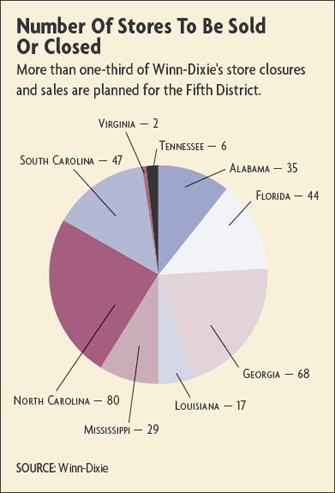Econ Focus
Short Takes - Bye-Bye, Winn-Dixie
By Charles Gerena
Bankrupt Grocer Pulls Out of Fifth District
Winn-Dixie Stores once commanded so much of the supermarket business that federal regulators barred it from making acquisitions from 1966 to 1976. But the new millennium hasn't been kind to the 80-year-old retailer, bringing major changes in the industry and five straight years of declining sales.
In February, Winn-Dixie filed for bankruptcy. The Jacksonville, Fla., company plans to shed 35 percent of its stores and 28 percent of its workforce under a proposed reorganization plan, with the Fifth District losing 129 outlets and potentially 9,000 or more Winn-Dixie employees.
Winn-Dixie has downsized several times since 2000, but the current round will be the largest yet. The company will completely pull out of four states — Tennessee, Virginia, North Carolina, and South Carolina — and trim operations in Florida, Georgia, Alabama, Mississippi, and Louisiana. According to a June 21 press release, the goal is to retreat from markets where the company "has either had a difficult market position, unsatisfactory financial performance, and limited opportunities for profitable sales growth, or it has determined that the stores ... are too distant from its continuing distribution facilities to be operated on a cost-effective basis."
Traditionally, profit margins of supermarkets are thin. Competition from mass merchandisers like Wal-Mart and Target and drugstore chains like CVS and Walgreens has squeezed margins further. Fifth District grocers have responded in different ways.
Food Lion and Mauldin, S.C.-based BI-LO have tried to emphasize low prices. Arguably, this is territory already well marked by Wal-Mart. In addition, the demand for food doesn't change significantly in response to price changes — in the aggregate, it is "price inelastic." An April 2004 study published in the Journal of Business concluded that, "consumer expenditures [on groceries] respond more to varying levels of assortment ... and promotion than price."
So, other grocers like Richmond-based Ukrop's Super Markets and Matthews, N.C.-based Harris Teeter have taken a different approach. Instead of focusing on low prices, they present their offerings as higher quality and promote a commitment to customer service. That leaves chains like Winn-Dixie stuck in the middle without a sizeable niche. Unless the company's executives dramatically reposition their stores, say industry observers, this situation won't change.
As of July 19, Winn-Dixie received bids on 102 of the 326 stores on the chopping block. Pending the approval of these bids by a Florida bankruptcy court, most of these stores will operate as supermarkets and retain some Winn-Dixie employees. Thirty-five of these outlets are in North Carolina and nine are in South Carolina.


